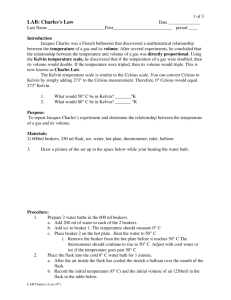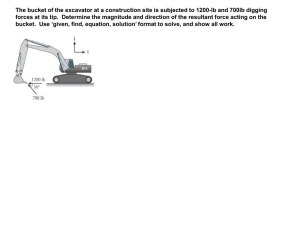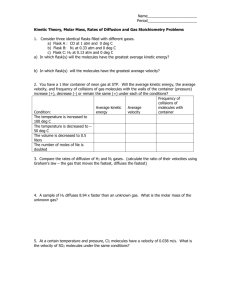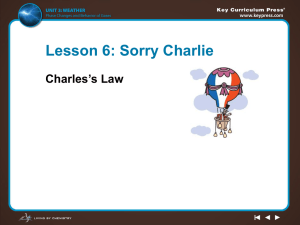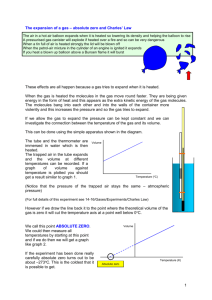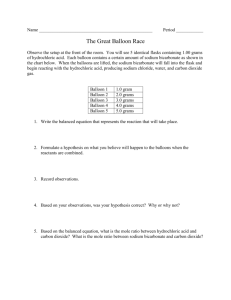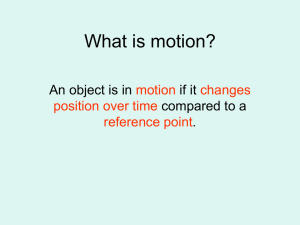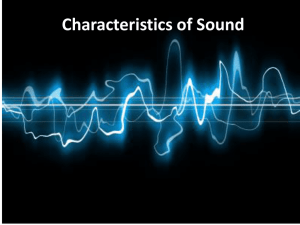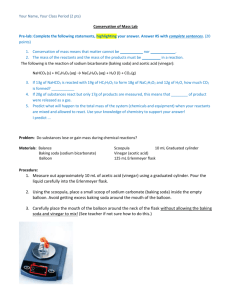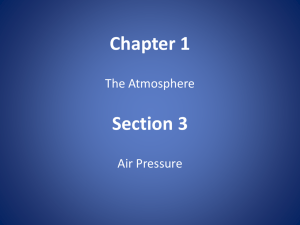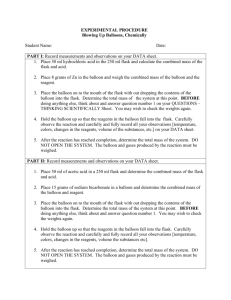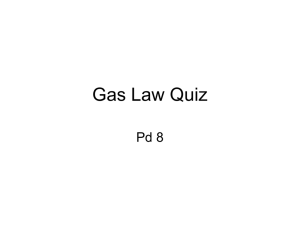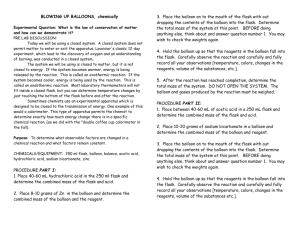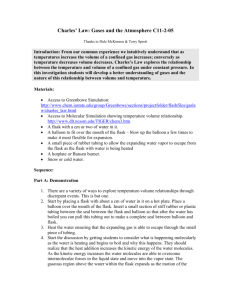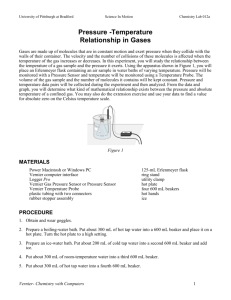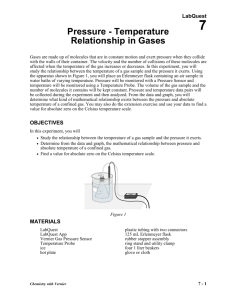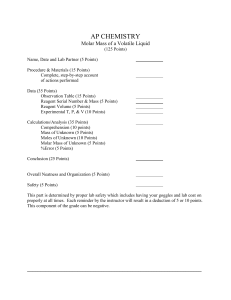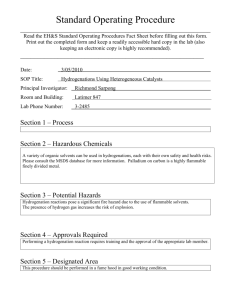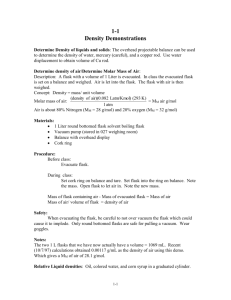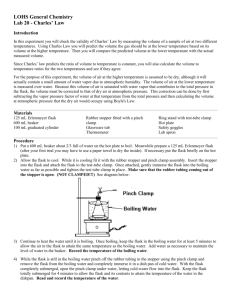Lesson 44 questions – Ideal Gas Equation - science
advertisement
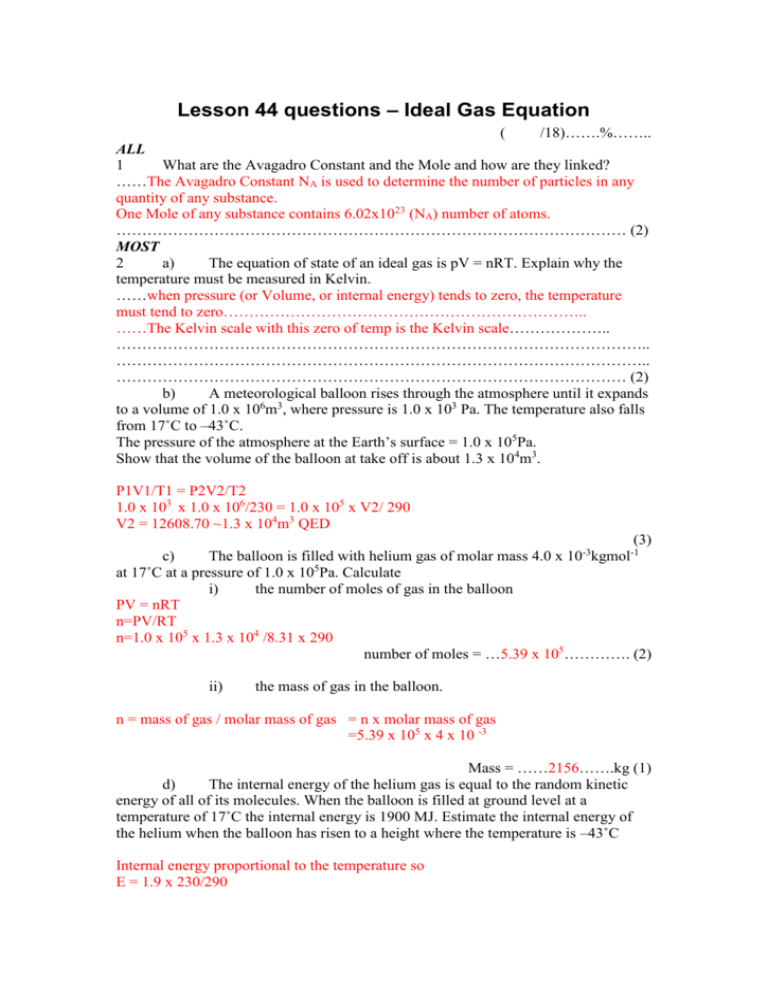
Lesson 44 questions – Ideal Gas Equation ( /18)…….%…….. ALL 1 What are the Avagadro Constant and the Mole and how are they linked? ……The Avagadro Constant NA is used to determine the number of particles in any quantity of any substance. One Mole of any substance contains 6.02x1023 (NA) number of atoms. ……………………………………………………………………………………… (2) MOST 2 a) The equation of state of an ideal gas is pV = nRT. Explain why the temperature must be measured in Kelvin. ……when pressure (or Volume, or internal energy) tends to zero, the temperature must tend to zero…………………………………………………………….. ……The Kelvin scale with this zero of temp is the Kelvin scale……………….. ………………………………………………………………………………………….. ………………………………………………………………………………………….. ……………………………………………………………………………………… (2) b) A meteorological balloon rises through the atmosphere until it expands to a volume of 1.0 x 106m3, where pressure is 1.0 x 103 Pa. The temperature also falls from 17˚C to –43˚C. The pressure of the atmosphere at the Earth’s surface = 1.0 x 105Pa. Show that the volume of the balloon at take off is about 1.3 x 104m3. P1V1/T1 = P2V2/T2 1.0 x 103 x 1.0 x 106/230 = 1.0 x 105 x V2/ 290 V2 = 12608.70 ~1.3 x 104m3 QED (3) c) The balloon is filled with helium gas of molar mass 4.0 x 10-3kgmol-1 at 17˚C at a pressure of 1.0 x 105Pa. Calculate i) the number of moles of gas in the balloon PV = nRT n=PV/RT n=1.0 x 105 x 1.3 x 104 /8.31 x 290 number of moles = …5.39 x 105…………. (2) ii) the mass of gas in the balloon. n = mass of gas / molar mass of gas = n x molar mass of gas =5.39 x 105 x 4 x 10 -3 Mass = ……2156…….kg (1) d) The internal energy of the helium gas is equal to the random kinetic energy of all of its molecules. When the balloon is filled at ground level at a temperature of 17˚C the internal energy is 1900 MJ. Estimate the internal energy of the helium when the balloon has risen to a height where the temperature is –43˚C Internal energy proportional to the temperature so E = 1.9 x 230/290 Internal energy = ……1500………MJ (2) 3 a) Very high temperature, for example, the temperature of the solar corona at half a million degrees, are often stated without a complete unit, i.e. degrees Celsius of Kelvin. Suggest why it is unnecessary to give degrees Celsius or Kelvin in this case. ……because there is only 273 degrees between 0 Kelvin and 0 Celsius when dealing with thousands it becomes meaningless.…………………………………………… ………………………………………………………………………………………… ………………………………………………………………………………………… …………………………………………………………………………………… (2) b) Two students attempt the same experiment to find how air pressure varies with temperature. They heat identical sealed glass flasks of air, to be considered as an ideal gas, in an oil bath. The flasks are heated from 300k to 400k. The pressure in flask A rises from atmospheric pressure, p0, as expected, but the pressure in flask B remains at p0 because the rubber bung is defective and air leaks out of the flask. i) Calculate the pressure in flask A at 400K in terms of p0. P1V1/T1 = P2V2/T2 – V1=V2 p/400 = p0/300 ii) to flask A at 400K. f Pressure = …1.3 p0………………… (2) Calculate the fraction, f, of gas molecules in flask B compared = number of gas molecules in B at 400K number of gas molecules in A at 400K number of gas molecules is proportional to pressure (or 1/T) ( from PV = nRT) f = ………0.75………………. (2)
